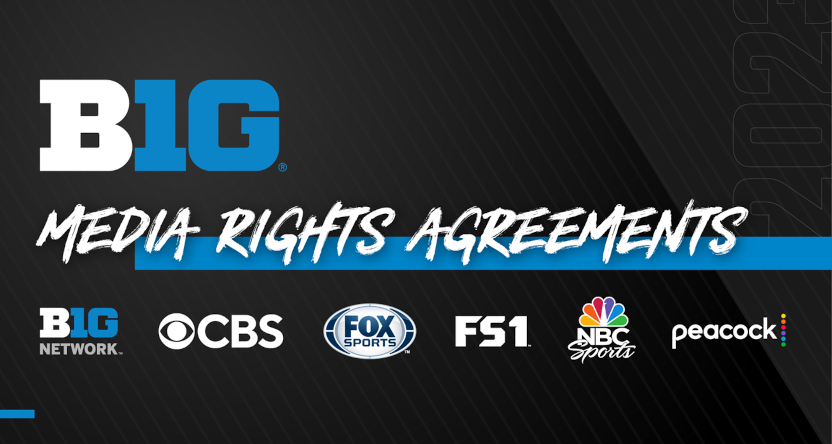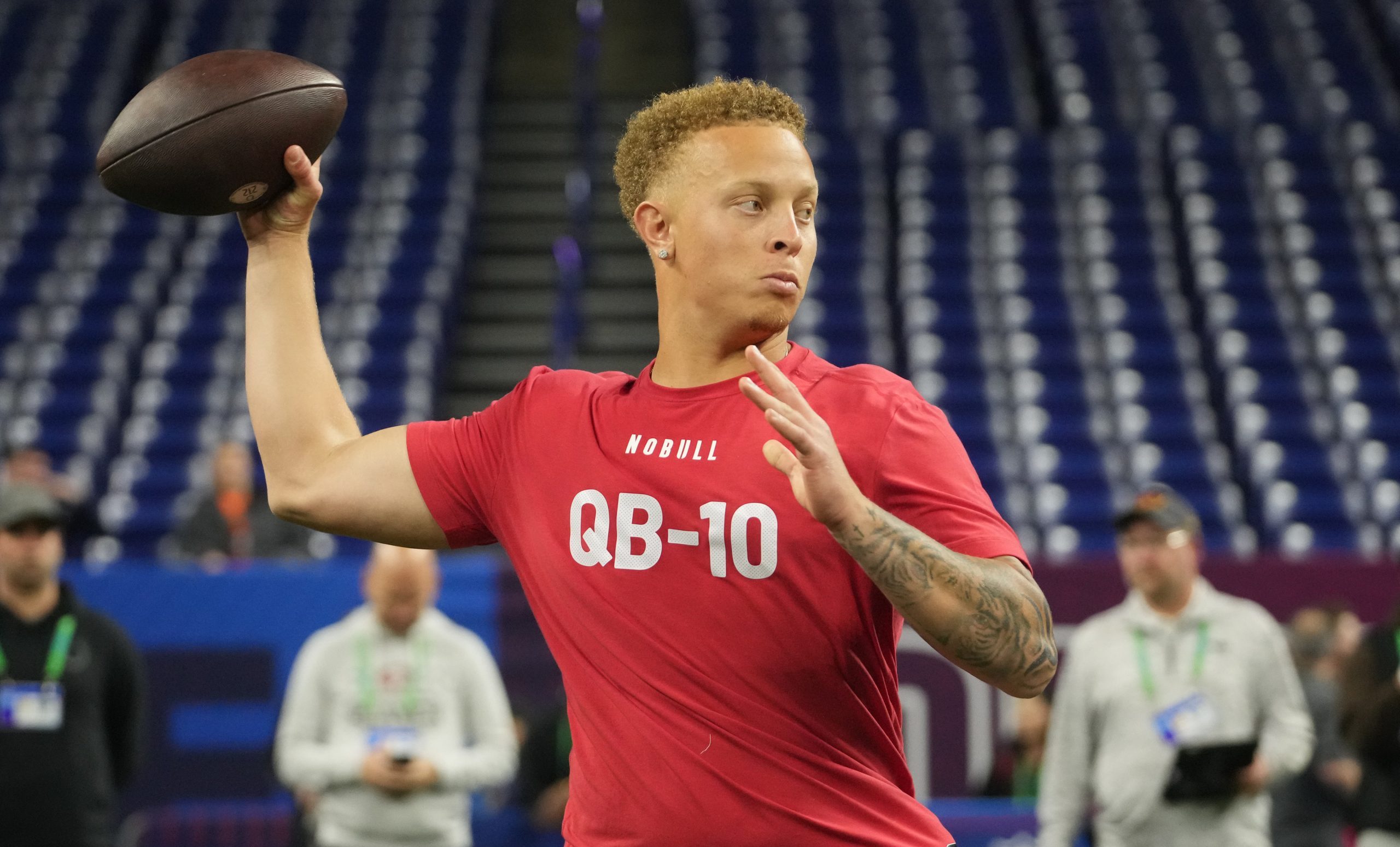On Thursday, our long national nightmare ended when the Big Ten announced their slate of new media rights deals with CBS, Fox, and NBC.
There are a lot of interesting details in those deals, and there’s a lot to unpack. Digging in, here are our picks from the winners and losers from the deals.
Winner: Fox Sports
Duh and/or hello. Fox’s retention of the Big Ten’s rights (which was reported early in the process) as the conference’s primary media rights partner was necessary for the continued success of its Big Noon window. Imagine if the inexplicable happened and Fox lost the rights, or wasn’t even the primary partner – due to ESPN’s long-term deals with the ACC and SEC, Fox would have been looking at the Big Noon package being centered around a Texas and Oklahoma-free Big 12 or a USC and UCLA-free (to be fair, their move was announced after Fox’s retention of the rights was reported) Pac-12. Neither of those would have worked out well long-term at all, and Fox would have had to go back to the drawing board for its college football coverage.
But all that is moot with Fox staying at the forefront of the picture, and that’s probably why they’re the biggest winner (outside of the Big Ten itself) here.
Loser: Amazon
Amazon wanted to get a foothold with the Big Ten and failed due to the company’s agreements with long-established networks. It’s a tough blow for the company, whose only remaining college football options in the near future are the Big 12 and Pac-12, both of which lack the overall marketability of the Big Ten.
Apple is in a similar boat to Amazon, though it seems like most of their interest was in the Pac-12 rather than the Big Ten due to the company’s west coast roots.
Winners: Paramount+ and Peacock
The two streaming outlets owned, respectively, by CBS and NBC pick up more content in the media deals. It doesn’t appear that Paramount+ will be getting anything exclusive, just simulcasts of all the games on CBS. It’s not a game changer, but no one will complain about getting access to content without a cable/satellite/streaming subscription or an antenna.
Peacock, on the other hand, will simulcast everything on NBC while also adding exclusive content. NBC’s release discussing the deal mentions “eight additional Big Ten Football games each season” exclusively on Peacock, along with “dozens of men’s and women’s basketball games (including multiple games each year in the Men’s and Women’s Big Ten Tournaments), Olympic sports, golf and more, providing hundreds of hours of Big Ten content.” Sure, it’s not amazing for fans that a lot of this content is going behind the Peacock paywall, but Peacock really needed more excess sports inventory. It now has that inventory, which should help increase subscribers who are diehard fans of their Big Ten schools.
Loser: CBS Sports Network
The CBS deal with the Big Ten wasn’t nearly as vast at those signed by Fox and NBC, and that lack of inventory resulted in CBS Sports Network getting the shaft. The cable network wasn’t mentioned once in the official release on Thursday from CBS Sports. In and of itself, this isn’t all that surprising, given the fact that CBSSN doesn’t have much top-tier content over the course of the year.
However, it didn’t even get any scraps! That’s kind of cold, and I wonder if this is a sign of things to come for CBS Sports Network. To me, it’s surprising the network outlasted NBCSN, and I’m curious if we start to see more content migrated from cable to streaming on Paramount+ as new rights deals are signed by CBS in the coming months and years.
Winner: Notre Dame
The Fighting Irish are now in a great position heading into the expiration of their own media rights deal. NBC desperately wanted a Big Ten deal to pair with its array of Notre Dame home games. They now have that doubleheader they’ve been craving, but Notre Dame can pop that balloon by leaving for a conference or a different network if their expectations aren’t met by NBC.
Let’s say NBC doesn’t pony up, and Notre Dame joins the Big Ten. In this case, NBC will still get Notre Dame games, but probably not nearly as many as they were under their current deal with the school, and they’d also lose out on the doubleheaders they’ve been craving. If Notre Dame wouldn’t be satisfied with a new NBC deal and joined the ACC, that would be disastrous for the network – not only would they lose the doubleheader, but they’d also have a much smaller potential slate of Notre Dame games on their schedule (just nonconference games against Big Ten opponents).
Notre Dame has a whole lot of leverage now, and I’d expect them to ultimately stay with NBC for an absolute bounty. That rights fee would probably be lower if NBC didn’t land the Big Ten.
Ask again later: Big 12, Pac-12, ESPN
This is a cop out. I know it’s a cop out. I readily admit it’s a cop out. But in reality, it’s unclear how the Big Ten’s new media rights deals with affect the Big 12, Pac-12, and ESPN. For ESPN, it’s not a *good* thing that the company lost the Big Ten’s rights. That’s a lot of inventory out the window, and plenty of eyeball-drawing schools that won’t be on ESPN’s networks with any sort of regularity anymore. But what if ESPN takes the cash it could have given the Big Ten and retains the Big 12 and Pac-12, perhaps in an even larger package than the company currently owns? That would certainly fill the inventory holes, thought the popularity gap wouldn’t be closed.
If ESPN were able to minimize, or even eliminate, Fox’s interests in the Pac-12 and Big 12, they’d have a much stronger overall schedule, even without the Big Ten. It would be a far more top-heavy schedule for Fox, which would help the noon window at the potential cost of Fox’s other windows throughout the day (especially with CBS and NBC involved at 3:30 PM and primetime). If that were to happen, ESPN wouldn’t be in all that bad of a place despite losing the conference’s rights.
As for the Big 12 and Pac-12, two possible bidders in CBS and NBC are likely out of the running for their rights (not that they were ever considered strong contenders). And while that’s not ideal for the bidding, maybe those tech companies look at the two conferences as opportunities to get into the college football game and splash some cash now that the Big Ten is out of the picture. If that ends up happening and those two conferences end up getting more in fees than expected, it’s more difficult to argue the Big Ten’s new media rights deals ended up being bad for them.







